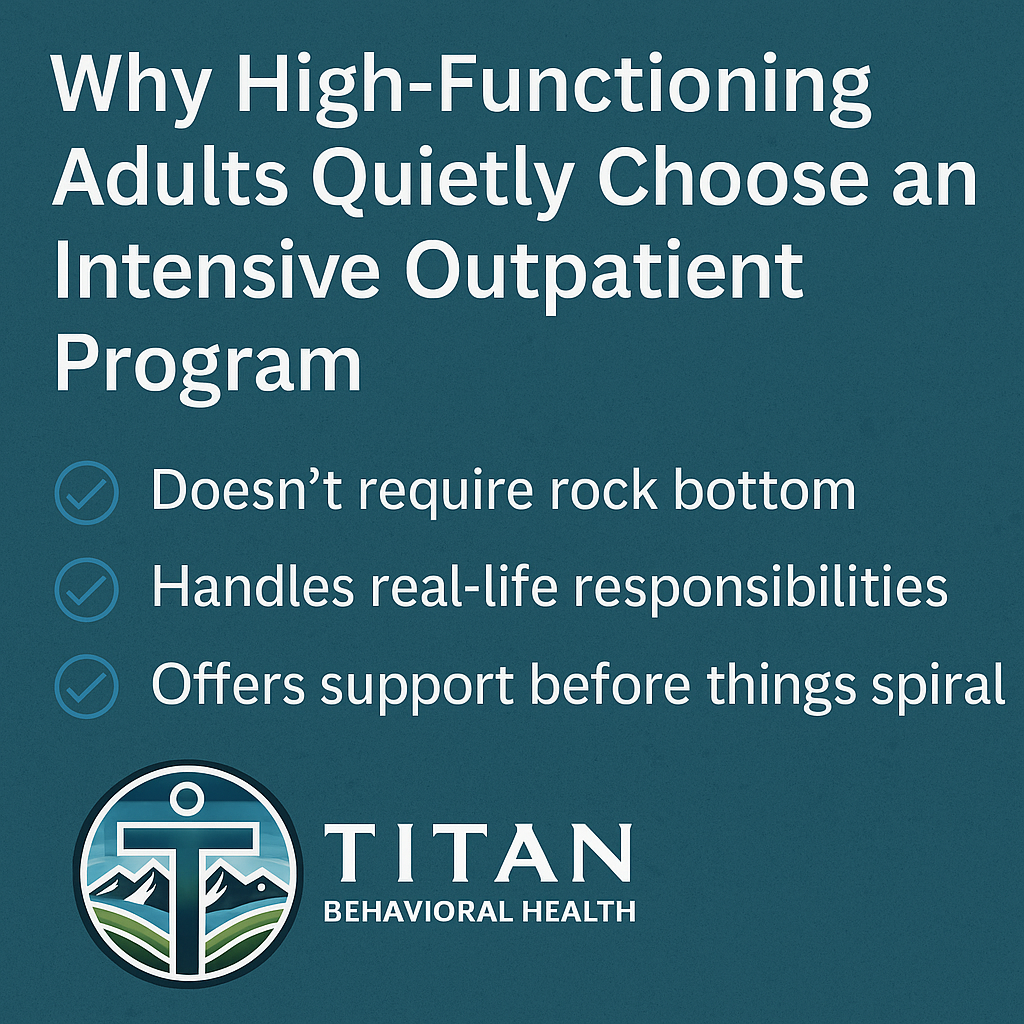There’s a specific kind of silence that settles in after you ghost a program. You were doing okay—at least, that’s what you told yourself. But group started feeling heavy. Life sped up. You missed one session. Then another. And then you stopped showing up altogether.
Now it’s been a few weeks. Maybe months. You’re still not falling apart, but you’re not really doing fine either. You start to wonder:
Was I ever really ready for treatment? Or did I just tap out too soon?
Here’s what you need to know: high-functioning adults leave treatment all the time. And many of them come back—not because they failed, but because they hit a point where they realized what they needed. Maybe that point is now.
You Didn’t Fail. You Paused.
Let’s get one thing clear: ghosting your IOP doesn’t mean you blew your only shot. It doesn’t mean you’re a lost cause or that the door is closed.
It means life got complicated. That internal pressure to handle everything quietly didn’t disappear just because you joined a group. You probably told yourself, “I’ll go back next week,” but the days kept stacking.
You’re not weak for pausing. You’re human. The structure of an intensive outpatient program in Las Vegas is meant to fit around your life—not erase it. If it stopped fitting, it’s okay to rework the fit.
Why High-Functioning Adults Often Choose IOP (Quietly)
Here’s the irony: people who are quietly falling apart rarely look like they need help.
You hold a job. Pay the bills. Pick up your kids. Post socially acceptable things. Meanwhile, the anxiety, the substance use, the constant mental noise—it’s all bubbling just below the surface. And the more you manage, the more isolated you feel.
That’s why IOP works so well for high-functioning people. It doesn’t require collapse. It doesn’t demand a dramatic rock bottom. It offers support before things spiral.
You don’t have to lose your job, ruin your relationships, or go inpatient. You just have to be willing to stop pretending for three hours a few days a week. That’s it.
When Dropping Out Isn’t a Failure—It’s Feedback
Maybe the group didn’t feel like a fit. Maybe the format felt too intense. Maybe you weren’t ready to say the words out loud.
Or maybe life just got in the way. That doesn’t mean you weren’t serious. It means you hit a limit—and you listened to it. That’s not sabotage. That’s information.
Now, you can use that information. You can ask for a different group. A new therapist. A modified schedule. Coming back doesn’t mean repeating the same experience. It means shaping it to fit who you are now.
The Real Reason It’s So Hard to Return
It’s not logistics. It’s not cost. It’s not time.
It’s shame.
That voice in your head that says, “They probably don’t want me back.” Or, “I already left—I can’t just waltz back in like nothing happened.”
Let’s name that for what it is: fear, dressed up as pride.
The truth? Most treatment teams expect clients to return. At Titan Behavioral Health’s intensive outpatient program, we build our programming with re-entry in mind. We know healing isn’t linear. You’re not the first person to leave early—and you definitely won’t be the last.
There’s no shame in starting again. Only honesty. And that’s what gets you free.

Signs It Might Be Time to Reconnect
Returning to IOP doesn’t require a breakdown. Sometimes, the signs are subtle—but persistent. Look for these:
- You feel emotionally flat, even if you’re “functioning” fine
- You’ve caught yourself using just to get through the day
- Your anxiety or irritability has crept back
- You’re avoiding the people who knew you were in treatment
- You keep thinking about returning… but keep talking yourself out of it
Those signs aren’t proof you failed. They’re proof you’re still paying attention. Use them.
What Coming Back Can Actually Look Like
Returning doesn’t mean explaining yourself. It means reaching out.
One email. One phone call. One simple: “Hey, is it okay if I come back?”
You don’t have to justify. You don’t have to apologize. At Titan, we’re ready when you are.
And this time, maybe we do it a little differently. New track. New schedule. New level of support. Whatever fits.
Because this time, you’re not starting from scratch. You’re building on what you already know about yourself.
You’re Not Alone—You’re Just Early in the Story
Most people don’t get it right on the first try. That’s not unique to you. That’s the norm.
In fact, some of the strongest clients we’ve worked with are the ones who left and came back. They came back clearer. More honest. Less afraid of doing it “wrong.”
IOP isn’t about doing recovery perfectly. It’s about practicing new ways of being—with support, structure, and people who get it.
If you left, and you’re still thinking about it… that’s your sign. The work isn’t over. And neither is your shot.
FAQ: Returning to an IOP After Dropping Out
Can I rejoin if I left mid-program?
Yes. Most IOPs, including ours at Titan, understand that people leave for many reasons. You’re welcome to return, and we’ll help you restart in a way that feels doable.
Do I have to start from the beginning?
Not necessarily. We’ll assess where you left off, what worked, what didn’t, and help you reenter with a plan that makes sense for where you are now.
Will I be judged by staff or peers?
No. Re-entry is common and supported. Our staff are trained to treat every return with respect and care—and many of your peers have been there too.
What if I can’t commit to the same schedule?
We’ll work with you. Our IOP offers flexible scheduling options to help accommodate work, school, or family needs.
What makes Titan’s IOP different?
Titan Behavioral Health’s intensive outpatient program in Las Vegas is designed to support high-functioning adults with real-life responsibilities. We offer practical therapy, peer support, and structured care that fits your schedule and your actual life.
📞 Ready to reconnect—on your terms?
Call (888) 976-8457 or visit to learn more about our intensive outpatient program services in North Las Vegas, NV. Whether you’re starting fresh or picking up where you left off, we’re here when you’re ready.

